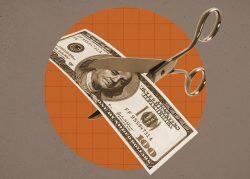Deals are down over 20 percent in San Francisco, according to a new residential market report from Compass, the second month of data indicating that the red-hot market may finally be coming to an end. Only 600 listings went into contract in May 2022, compared with nearly 800 a year ago.
Compass Chief Market Analyst Patrick Carlisle, author of the report, saw hints of a coming slowdown in his April report but considered the May data as a signal of “very clear, substantial signs of slowing/cooling,” he said via email, especially in the city’s condo market.
There were over 1,100 active overall listings on the market in May, according to Compass data, compared with about 950 one year ago. Price reductions were up 50 percent during the same period.
The declines in sales accompanied by increase in active listings and price reductions point to insecurities on both ends of the market’s spectrum, Carlisle said. The interest rate hikes over the last few months have had a big impact on entry-level condo buyers. Higher-end single-family buyers may be loath to sell stocks, particularly tech stocks, that have taken a dip recently in order to buy their homes.
“Both factors affect the general psychology of the market, and media coverage of the market, which deeply affects that psychology,” he said.
He expects to see the double-digit pricing appreciation trends for single-family homes in the last few years come down, which he cautions is not the same as seeing them become less expensive.
“As an analogy, if traffic is going 100 miles per hour and drops to 65, it feels a lot slower, but cannot reasonably be described as slow,” he writes in the report.
Because the homes that are priced right and well prepared for market are still selling quickly, Carlisle said that the city won’t really know how prices are affected until some of the properties that came to market earlier this spring actually close.
“The homes not selling, which may well have to go through price reductions, will take a while to sell and will start to influence median sales prices when they do,” he said.
Compass data has been supported anecdotally by San Francisco real estate agents, who started noticing the cooling trend in the spring and largely expect it to extend into summer, where it will be compounded by the typical seasonal trends that were less important the last few years, when people were not traveling as much.
The big question will be what happens during the normally fast and furious fall selling season, which is shorter than the spring and likely to be impacted by a sustained summer cooldown. Carlisle said it’s too soon to say.
“Some buyers are as hot as ever, while others are not,” he said. “Some sellers are definitely trying to get their homes on the market sooner than later.”
Read more


